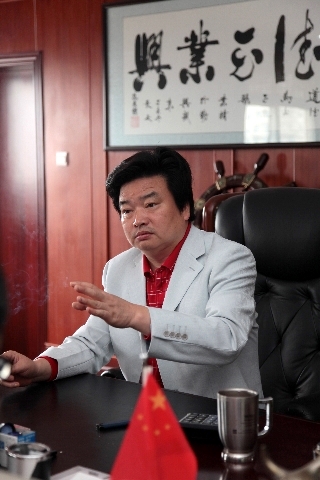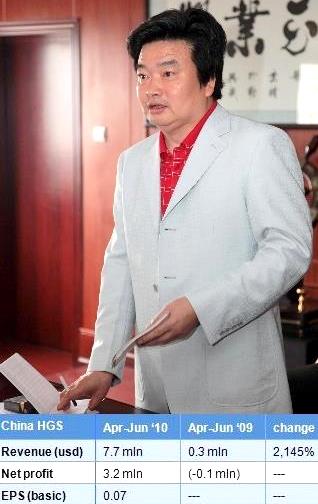
CHINA HGS Real Estate Inc. (Nasdaq: HGSH) has ambitious plans to become one of China’s top residential property developers targeting Tier II and III cities.
NextInsight spoke with Chairman and CEO Zhu Xiaojun and learned that China HGS may well be a stock worth watching.
Apparently the officials on Nasdaq think so too because China HGS was recently promoted from the OTC Bulletin Board to the Nasdaq Global Market.
"We are honored to be approved to list on the Nasdaq Global Market, one of the world's most prestigious stock markets," said Mr Zhu.
"This is a significant milestone for China HGS' growth as a US public company. It reflects our commitment to enhance our corporate governance and increase shareholder value. We expect that our listing upgrade will enhance our profile in the US capital markets, further expand our investor base and increase both our liquidity and visibility in the investment community."
He told NextInsight that HGS chose New York as the venue to get listed last year for reasons of practicality.
“For our destination, we were seeking both stability and reputation. Also, candidates for the A-share markets here have to wait in a very long line for a very long time. And we appreciated the higher profile and recognition that we would get on the Nasdaq. So the timing was quite right for us.”
He also said the same went for Hong Kong or Singapore, though there was no long cue to contend with.
“While we are very pleased with our upgrade to Nasdaq, we do realize it takes time for investors to fully understand your business model and value. But with the promotion, we do feel we are in a much more advantageous position to allow for more appreciation for our potential. To this end, we also need to boost both our public relations and investor relations campaigns.
“We need to both work and communicate our way to achieve a fair value,” Mr. Zhu said.
Higher ASPs = Higher Guidance
The company recently raised its financial guidance for fiscal 2010, fueled by better-than-expected growth in residential properties.
For the fiscal year ended September 30, China HGS projects revenues between 47.5-49.0 mln usd, up from original guidance of 46.4 mln.
And net income is forecast to range between 15.5-16.0 mln usd, up from original guidance of 13.0 mln.

China HGS’ increased guidance reflects stronger-than-expected growth in ASPs (Average Selling Prices), which increased approximately 14.6 usd to 43.9 usd per square meter in January 2010.
“We are experiencing robust growth in ASPs of our real estate projects and expect these prices to continue to trend higher. The key growth drivers for rapid growth in Hanzhong (Shaanxi Province) have remained intact and prices for residential properties have steadily increased since 2009,” said Mr. Zhu.
In the April-June period, revenue jumped 21-fold to 7.7 mln usd from just 0.3 mln a year earlier due to the development of several new projects in the quarter, growing brand recognition and rising levels of local residents' disposable income. HGS sold a total of 288 residential and commercial units and car parks, compared to only 14 residential units a year earlier.
"During the quarter, market demand for residential properties in Hanzhong, our core market, continued to exhibit solid growth. Thanks to a larger inventory of units available and our strong reputation, we sold units at attractive margins. This resulted in another quarter of significant top line and bottom line growth," Mr. Zhu said.
“Most importantly, we have not witnessed significant speculation in the local real estate market. While the Chinese government has recently tightened the monetary policy, we believe it largely targets Tier I and Tier II cities and will be of minimal impact to our operations. We are confident in our ability to achieve our guidance for fiscal year 2010,” he added.
China HGS specializes in real estate development in China's second-tier and third-tier cities, with a land bank featuring multi-layer, sub-high-rise and high-rise apartment buildings.
It possesses a national grade II real estate qualification and has ranked as the No.1 property developer in the center of Hanzhong, Shaanxi Province in terms of market share in since 2007.
Mr. Zhu says that before investors downplay this achievement, they should know that Hanzhong has a population of 3.8 mln people.
That would make it the second biggest city in Canada after Toronto, and tied with Los Angeles for No.2 honors in the US!

HGS acquires development sites primarily through public auctions of government land, and says it is practices a “very disciplined bidding process.”
Disciplined or not, the company made waves late last year when it acquired 180 acres of land through bidding on an auction held by the local Land Consolidation and Rehabilitation Center of Hanzhong City, a major addition to its land bank which allowed HGS to break ground on major new residential complexes.
But this ambition is in line with the company’s overriding objective.
“Our goal is to become the leading residential property developer focused on China’s Tier II and Tier III cities,” Mr. Zhu said.
“We are seeing a very attractive growth in residents’ disposable income in these cities relative to the Tier I coastal cities, which further boosts demand for real estate. Also we face significantly lower competition in these Tier II and Tier III cities.”
He said that HGS had found a “niche” of sorts focusing on less-populated cities, especially in China’s hinterlands in provinces like Shaanxi, which still are playing a game of economic “catch up” with more affluent maritime provinces like Jiangsu, Zhejiang and Guangdong.
“Investors should understand that there are extremely promising property investment opportunities in China’s Tier II and Tier III cities, as the government is not only actively promoting a ‘Go West’ economic development strategy, but most experts fully expect the PRC’s urban population rate to reach 47% by the end of this year, up four percentage points from just a year earlier. And it is the Tier II and Tier III cities that are growing the fastest.”
He said this steady trend toward urbanization was driving demand for real estate, especially residential properties, in cities like Hanzhong in the western Chinese province of Shaanxi.
“Actually the 47% national urbanization target is a goal within the Five-Year Plan, so the government is actively trying to make it happen. This naturally leads to rapid growth of the residential property sector in Tier II and Tier II markets, and that is exactly what we at HGS are focused on.”
But did the rapid home construction in these medium-sized urban areas mean the unwelcome attention of government regulators hell bent on preventing real estate bubbles caused by speculative activity?
“Not at all, actually. There are less significant and smaller-scale property bubbles in such cities relative to Tier I cities and the onerous restrictions that exist in various forms in cities like Beijing and Shanghai are neither targeted at, nor applied in, Tier II and Tier III cities.”
China recently added new regulations to the property sector in terms of restricting second-home purchases, and also levied new taxes, but Mr. Zhu said these policies do not have significant impact on Tier II and Tier III cities.

“These don’t impact us in our markets as we don’t anticipate bubbles where we operate. Also, we don’t expect any new policies to suddenly target Tier I and Tier II markets in the hinterlands. These markets are definitely more protected from new property-control measures than the big coastal cities because the government is supporting the waves of migration from the countryside to these types of urban areas.”
And Mr. Zhu said that he believed supply and demand would be the ultimate determinant of any property market's success, whether nestled against the South China Sea or located a thousand kilometers inland.
“I think it is hard to prevent speculation outright. However, I fully believe that demand is still strong and supply and demand will continue to rule how the market grows and operates.”
He added that although HGS is the top developer in Hanzhong, the firm is actively preparing to expand to other adjacent provinces to tap into new Tier II and Tier III cities.
Despite higher average gross profit margins for commercial development in Hanzhong at present, Mr. Zhu said HGS would remain focused on residential properties in the city.
“The US investment climate is weaker now so our US-listed shares are underpriced. However, we will continue to focus on medium-sized city markets and stay away from Tier 1 cities with their higher competition, bubbles and more restrictions. And we’ve seen all quarters improving this year. This will help make a case for a stronger HGS share price.”

